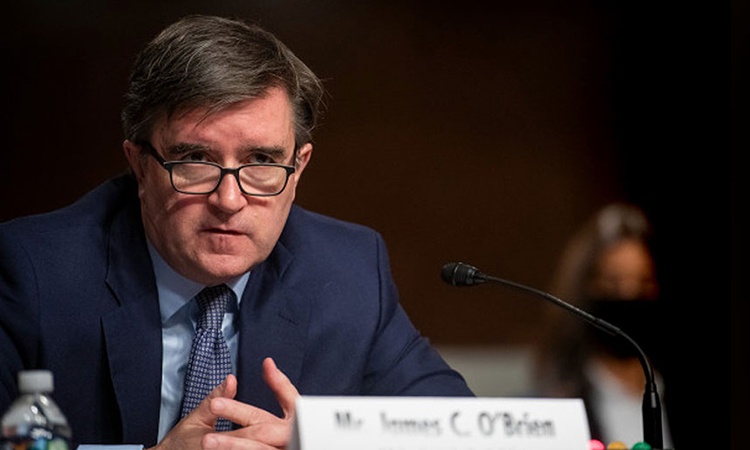"Georgian nightmare". EU delegates on the 'foreign agents' bill
EU delegates at the rally in Tbilisi
The adoption of the “Transparency of Foreign Influence” law, commonly referred to as the “Russian law” in Georgian society, coincided with the visit of the EU delegation to Georgia. Its representatives heavily criticized the “foreign agents” bill.
- Georgian Parliament approved the “foreign agents bill” in the third and final reading
- Freedom House condemns repression of peaceful demonstrators in Georgia
- Opponents of ‘foreign agents bill’ detained near Parliament amid heavy police presence
“The adopted law is a step taken in a very wrong direction,” stated Pavel Fischer, Chairman of the Czech Senate Committee on Foreign Affairs, Defense, and Security, at a press conference held on May 14 after meetings in Tbilisi.
Fischer said that amendments to this law would not improve the situation. He also mentioned other laws recently passed by the Georgian parliament or currently under consideration.
Specifically, he referred to the law on offshore companies or the propaganda against the LGBT community:
“All these laws show us the inconsistency with the path we see for Georgia’s European integration and the possibility of cooperation.”
“A Georgian nightmare,” characterized the current situation in Georgia by the Chairman of the Lithuanian Seimas Committee on Foreign Affairs, Žygimantas Pavilionis.
He recalled Lithuania’s history when it tried to join the European Union. In 1997, Lithuania was similar to Georgia, Pavilionis said:
“We didn’t listen to Brussels back then: ‘Oh, these Europeans with their sovereign rights.’ And we weren’t invited to join the negotiations; only Estonia was invited.”
According to Pavilionis, it took Lithuania two years to convince the Council of Europe to start accession negotiations.
He emphasized that only the best could achieve membership in the European Union. It’s a competition, and a country seeking to join must convince all officials in the European Commission, all countries, which is undoubtedly challenging.
Pavilionis stated that the “Georgian nightmare” is now competing with the worst of countries:
“I’ve heard that Hungary is trying to adopt a similar law; I’ve heard that Kyrgyzstan recently adopted it. There’s not even a chance to enter the European Union with it; only the best will get in, and they are not the best.”
“I am disappointed,” said Michael Roth, head of the Foreign Affairs Committee of the Bundestag, who is also in Tbilisi.
According to him, the ruling party is making incorrect forecasts. And one of the worst things that can happen is the loss of reputation and trust:
“In these difficult times, reputation and authority are a huge, huge, huge plus. I am very disappointed because not only the government and the parliamentary majority, but also the people will have to pay a high price for this.”
Roth also spoke about sanctions. According to his information, civil society activists and parliamentarians are calling for their imposition. But the most severe sanction is the loss of candidate status.
“In June, the European Union and the European Commission are going to start accession negotiations with Ukraine and Moldova, but where is Georgia? It’s terrible.”
Michael Roth also touched upon the possible suspension of visa-free travel for Georgian citizens. He stated that the EU does not want to punish the younger generation because the cessation of visa-free travel will affect people who are now on the streets, but continuing as before is no longer possible:
“Our recommendation to the EU and our governments is that we cannot continue business as usual.”
EU delegates at the rally in Tbilisi
Members of the delegation at the rally
After the press conference, members of the EU delegation attended a protest rally taking place in front of the parliament building. They addressed the rally participants with speeches.
“Revoke this law,” Michael Roth appealed to the Georgian authorities.
“Tonight we came to show solidarity. Your fight for freedom is our fight for freedom. We are here to support and assist you. Tonight, we are all Georgians,” Pavel Fischer addressed the rally participants.
“Dear friends, my president stood here in 2008 [during the Russo-Georgian War] alongside other presidents. And here we stand again. Tomorrow in the US Senate, together with other parliamentarians, we will issue a statement calling this law ‘Putin’s law.’ We must stop Putin in Ukraine and Georgia. You will be members of the European Union and NATO,” said Žygimantas Pavilionis to the rally participants.
“Thank you!” chanted the participants after his speech. The anthems of Georgia and the European Union were sung at the rally.
At the end, the organizers presented roses to the European delegates.
The chairpersons of the foreign affairs committees of EU member states’ parliaments arrived in Georgia on May 13. They wanted to meet with representatives of Georgia’s ruling circles. However, the Georgian authorities did not provide such an opportunity. Only at the office of “Georgian Dream” did they manage to meet with the head of the parliamentary committee on foreign affairs, Nikoloz Samkharadze.
On May 10, the speaker of the Georgian parliament, Shalva Papuashvili, announced that he would not meet with EU delegation representatives as they had chosen an inappropriate time for their visit.
EU delegates at the rally in Tbilisi



















